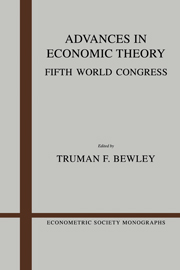Book contents
- Frontmatter
- 1 Auction theory
- 2 Game-theoretic analyses of trading processes
- 3 The theory of contracts
- 4 Battles for market share: incomplete information, aggressive strategic pricing, and competitive dynamics
- 5 A sequential strategic theory of bargaining
- 6 On the complexity of linear programming
- 7 Laboratory experimentation in economics
- 8 Increasing returns and the theory of international trade
- 9 Strategic aspects of trade policy
- 10 Equilibrium without an auctioneer
- 11 Arrow-Debreu programs as microfoundations of macroeconomics
3 - The theory of contracts
Published online by Cambridge University Press: 05 January 2013
- Frontmatter
- 1 Auction theory
- 2 Game-theoretic analyses of trading processes
- 3 The theory of contracts
- 4 Battles for market share: incomplete information, aggressive strategic pricing, and competitive dynamics
- 5 A sequential strategic theory of bargaining
- 6 On the complexity of linear programming
- 7 Laboratory experimentation in economics
- 8 Increasing returns and the theory of international trade
- 9 Strategic aspects of trade policy
- 10 Equilibrium without an auctioneer
- 11 Arrow-Debreu programs as microfoundations of macroeconomics
Summary
Introduction
The past decade has witnessed a growing interest in contract theories of various kinds. This development is partly a reaction to our rather thorough understanding of the standard theory of perfect competition under complete markets, but more importantly to the resulting realization that this paradigm is insufficient to accommodate a number of important economic phenomena. Studying in more detail the process of contracting - particularly its hazards and imperfections - is a natural way to enrich and amend the idealized competitive model in an attempt to fit the evidence better. At present it is the major alternative to models of imperfect competition; we will comment on its comparative advantage below.
In one sense, contracts provide the foundation for a large part of economic analysis. Any trade - as a quid pro quo - must be mediated by some form of contract, whether it be explicit or implicit. In the case of spot trades, however, where the two sides of the transaction occur almost simultaneously, the contractual element is usually downplayed, presumably because it is regarded as trivial (although this need not be the case; see Section 3). In recent years, economists have become much more interested in long-term relationships where a considerable amount of time may elapse between the quid and the quo. In these circumstances, a contract becomes an essential part of the trading relationship.
- Type
- Chapter
- Information
- Advances in Economic TheoryFifth World Congress, pp. 71 - 156Publisher: Cambridge University PressPrint publication year: 1987
- 458
- Cited by



